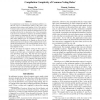Free Online Productivity Tools
i2Speak
i2Symbol
i2OCR
iTex2Img
iWeb2Print
iWeb2Shot
i2Type
iPdf2Split
iPdf2Merge
i2Bopomofo
i2Arabic
i2Style
i2Image
i2PDF
iLatex2Rtf
Sci2ools
121
click to vote
AAAI
2010
2010
Compilation Complexity of Common Voting Rules
In computational social choice, one important problem is to take the votes of a subelectorate (subset of the voters), and summarize them using a small number of bits. This needs to be done in such a way that, if all that we know is the summary, as well as the votes of voters outside the subelectorate, we can conclude which of the m alternatives wins. This corresponds to the notion of compilation complexity, the minimum number of bits required to summarize the votes for a particular rule, which was introduced by Chevaleyre et al. [IJCAI-09]. We study three different types of compilation complexity. The first, studied by Chevaleyre et al., depends on the size of the subelectorate but not on the size of the complement (the voters outside the subelectorate). The second depends on the size of the complement but not on the size of the subelectorate. The third depends on both. We first investigate the relations among the three types of compilation complexity. Then, we give upper and lower bo...
AAAI 2010 | Chevaleyre Et | Compilation Complexity | Computational Social Choice | Intelligent Agents |
Related Content
| Added | 29 Oct 2010 |
| Updated | 29 Oct 2010 |
| Type | Conference |
| Year | 2010 |
| Where | AAAI |
| Authors | Lirong Xia, Vincent Conitzer |
Comments (0)

